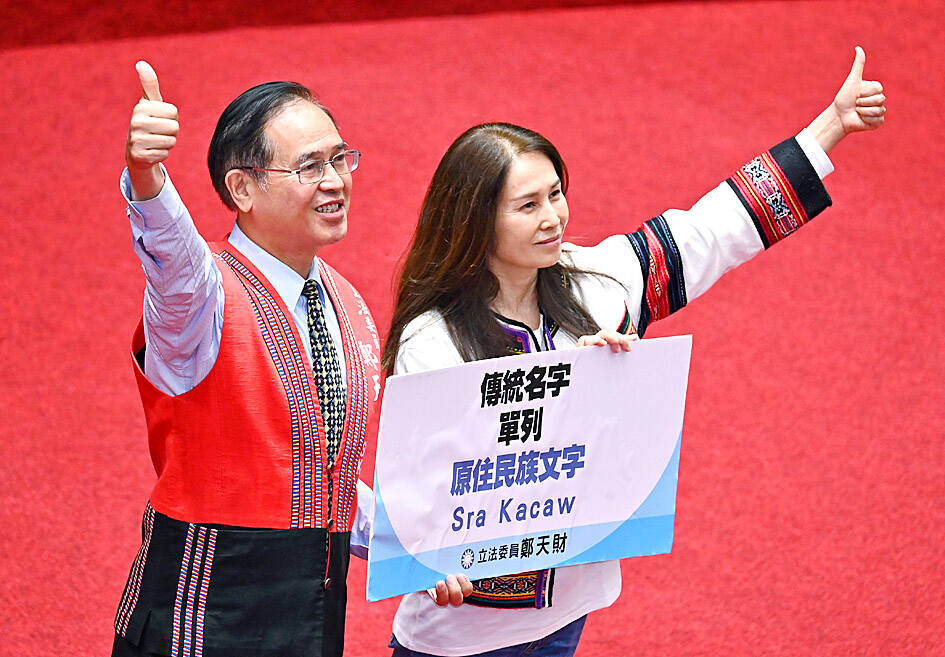Indigenous people would soon be allowed to use only their ethnic names in their own language when they sign household registration documents or apply for ID cards or passports after the Legislative Yuan yesterday passed amendments to the Name Act (姓名條例) in a plenary session.
Minister of the Interior Lin You-chang (林右昌) said in a statement that the passage of the bill carries historic significance.
“It not only shows the advancement of our society, but also the enhancement of our culture,” Lin said. “It facilitates integration and equality among different ethnic groups, and contributes to better understanding of one another.”

Photo: Liu Hsin-de, Taipei Times
The amendments offer legal protection for indigenous cultures and customs, in which language plays a crucial part, he said.
“We are encouraging indigenous people to pass on their cultures to the next generation,” Lin said. “We will work with other government agencies to determine if there are other measures that should be changed to honor the cultural rights of indigenous people.”
The current act stipulates that indigenous people and other minority ethnic groups must list their ethnic names along with their names in Chinese when they register their households, or apply for naturalization or passports.
The act allows people to change their name up to three times, but indigenous people who seek to change their name for cultural reasons would not count toward that total, the amendments say.
Those who have their ethnic names on their birth certificate or household registration documents can have it changed to Chinese or they can be switched from Chinese to their ethnic name, but such a change would only be allowed once, the amendments say.
Indigenous people can keep unchanged documents that bear their ethnic and Chinese names on their household registration, national ID cards and passports, and are not bound by Article 1 of the act, which requires people to have a single legal name.
The amendments authorize the Council of Indigenous Peoples to investigate and ascertain names of indigenous groups.
The council and the ministry should jointly compose guidelines that list the meanings of ethnic names, how they should be appropriated and other aspects, the amendments say.
Lawmakers also passed a motion requiring the ministry to submit a report to the legislature in three months on how it plans to update name systems in government agencies following passage of the amendments.
It also asked the council to complete in six months an investigation of indigenous names and stipulate standards to recognize valid ethnic names.
It must provide plans to allow people to change their names free of charge, the motion says.

The Coast Guard Administration (CGA) yesterday said it had deployed patrol vessels to expel a China Coast Guard ship and a Chinese fishing boat near Pratas Island (Dongsha Island, 東沙群島) in the South China Sea. The China Coast Guard vessel was 28 nautical miles (52km) northeast of Pratas at 6:15am on Thursday, approaching the island’s restricted waters, which extend 24 nautical miles from its shoreline, the CGA’s Dongsha-Nansha Branch said in a statement. The Tainan, a 2,000-tonne cutter, was deployed by the CGA to shadow the Chinese ship, which left the area at 2:39pm on Friday, the statement said. At 6:31pm on Friday,

The Chinese People’s Liberation Army Navy’s (PLAN) third aircraft carrier, the Fujian, would pose a steep challenge to Taiwan’s ability to defend itself against a full-scale invasion, a defense expert said yesterday. Institute of National Defense and Security Research analyst Chieh Chung (揭仲) made the comment hours after the PLAN confirmed the carrier recently passed through the Taiwan Strait to conduct “scientific research tests and training missions” in the South China Sea. China has two carriers in operation — the Liaoning and the Shandong — with the Fujian undergoing sea trials. Although the PLAN needs time to train the Fujian’s air wing and

The American Institute in Taiwan (AIT) put Taiwan in danger, Ma Ying-jeou Foundation director Hsiao Hsu-tsen (蕭旭岑) said yesterday, hours after the de facto US embassy said that Beijing had misinterpreted World War II-era documents to isolate Taiwan. The AIT’s comments harmed the Republic of China’s (ROC) national interests and contradicted a part of the “six assurances” stipulating that the US would not change its official position on Taiwan’s sovereignty, Hsiao said. The “six assurances,” which were given by then-US president Ronald Reagan to Taiwan in 1982, say that Washington would not set a date for ending arm sales to Taiwan, consult

A Taiwanese academic yesterday said that Chinese Ambassador to Denmark Wang Xuefeng (王雪峰) disrespected Denmark and Japan when he earlier this year allegedly asked Japan’s embassy to make Taiwan’s representatives leave an event in Copenhagen. The Danish-language Berlingske on Sunday reported the incident in an article with the headline “The emperor’s birthday ended in drama in Copenhagen: More conflict may be on the way between Denmark and China.” It said that on Feb. 26, the Japanese embassy in Denmark held an event for Japanese Emperor Naruhito’s birthday, with about 200 guests in attendance, including representatives from Taiwan. After addressing the Japanese hosts, Wang